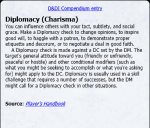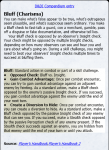Garthanos
Arcadian Knight
It has been brought up by @AbdulAlhazred Not an explicit quote.
I conjectured that the intimidate skill was allowed to route the enemy or force them to surrender.

In a much lesser and easier sense one might be able to use it stop even an enemy on the battle field from attacking you or someone near you or approaching closer.... would this take a standard action. Could it affect several adversaries near each other.. OR could you combine it with some flash bang move that would allow it to affect several.
ie the Intimidate skill lets theoretically any class do some bad ass things if the dm lets it... it would be useful for more explicit effects to be enumerated. My standing argument for enumerating abilities is it valuable to give the martial hero permission to do awesome things 9as well as explicitly limit the spell caster who has no intrinsic limits)
[h2]The Diplomancer [/h2]
So what if that same concept was applied to diplomacy? What are the pit falls? I know this concept may have been abused int the past, but I think its another route to awesome

Its currently pretty underfed conscripting the enemy seems an extreme that feels a bit like the effect achievable with intimidation and may only work when someone has been defeated and spared.
Diplomacy might convince an enemy you seem harmless so they do not attack you right now ... similar in reverse to the intimidate effect its less likely to work on a bloodied enemy or atleast one you have personally attacked.
[h2]The Deciever[/h2]
The bluff ability does have some enumerated combat ability as well is that enough? am I underestimating it?
it doesnt seem as wow as the intimidator.

Anyway it seems some enumerating skill use in combat has been done a bit via some skill powers ... but if the skills were properly expressed maybe that wouldn't even have been necessary?
this inspired the Diplomancer thoughts.If the warlord can defeat an enemy in battle why not let them convince the enemy to join them...
I conjectured that the intimidate skill was allowed to route the enemy or force them to surrender.

In a much lesser and easier sense one might be able to use it stop even an enemy on the battle field from attacking you or someone near you or approaching closer.... would this take a standard action. Could it affect several adversaries near each other.. OR could you combine it with some flash bang move that would allow it to affect several.
ie the Intimidate skill lets theoretically any class do some bad ass things if the dm lets it... it would be useful for more explicit effects to be enumerated. My standing argument for enumerating abilities is it valuable to give the martial hero permission to do awesome things 9as well as explicitly limit the spell caster who has no intrinsic limits)
[h2]The Diplomancer [/h2]
So what if that same concept was applied to diplomacy? What are the pit falls? I know this concept may have been abused int the past, but I think its another route to awesome

Its currently pretty underfed conscripting the enemy seems an extreme that feels a bit like the effect achievable with intimidation and may only work when someone has been defeated and spared.
Diplomacy might convince an enemy you seem harmless so they do not attack you right now ... similar in reverse to the intimidate effect its less likely to work on a bloodied enemy or atleast one you have personally attacked.
[h2]The Deciever[/h2]
The bluff ability does have some enumerated combat ability as well is that enough? am I underestimating it?
it doesnt seem as wow as the intimidator.

Anyway it seems some enumerating skill use in combat has been done a bit via some skill powers ... but if the skills were properly expressed maybe that wouldn't even have been necessary?
Last edited:
